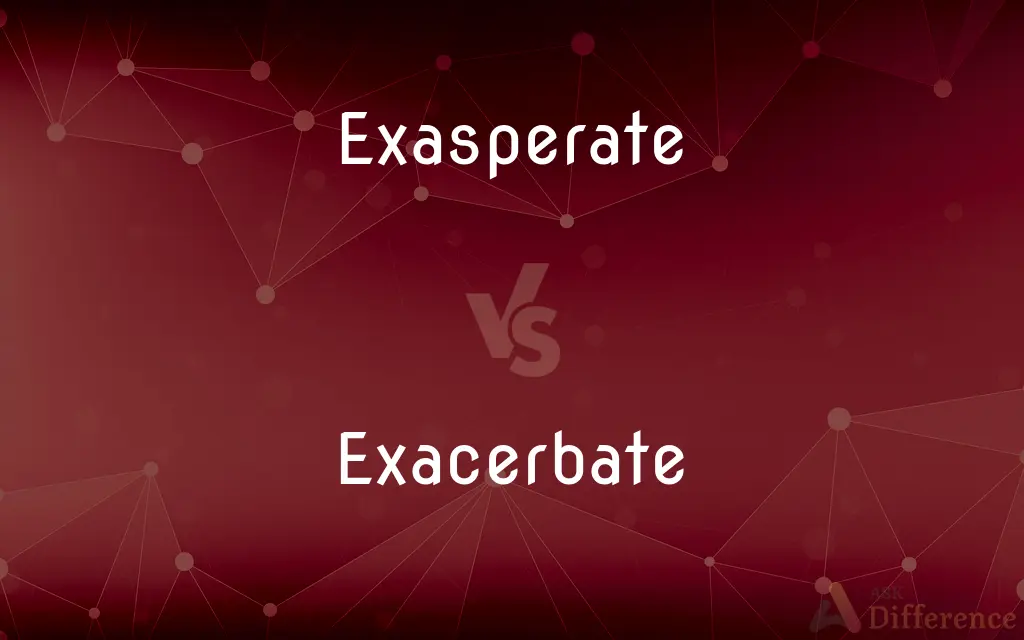Exasperate vs. Exacerbate — What's the Difference?
Edited by Tayyaba Rehman — By Urooj Arif — Updated on March 8, 2024
Exasperate means to irritate intensely, while exacerbate means to worsen a situation.

Difference Between Exasperate and Exacerbate
Table of Contents
ADVERTISEMENT
Key Differences
Exasperate refers to the act of annoying or irritating someone to a high degree, often leading to frustration or anger. It's typically used in the context of personal interactions or situations. On the other hand, exacerbate is used to describe making an already bad situation, condition, or problem worse, particularly in terms of severity or intensity.
The term exasperate is often applied in situations involving personal feelings or reactions, focusing on the emotional or psychological impact on an individual. Exacerbate, however, is generally used in broader contexts, including health, environmental issues, and social problems, indicating an increase in the negative aspects of a situation.
While exasperate is about the escalation of negative feelings or responses in people, exacerbate relates more to the escalation of negative states or conditions of things or situations. This distinction highlights how the former is more about personal impact, whereas the latter is about situational or condition-based impact.
Using "exasperate" correctly involves situations where the emphasis is on the emotional or mental state being negatively affected, such as in relationships or personal interactions. In contrast, "exacerbate" is appropriately used when discussing issues like diseases, environmental problems, or social conflicts, where the focus is on the worsening of the condition or situation.
The nuances of exasperate and exacerbate are important in communication, as misusing them can lead to misunderstandings. For example, saying someone's actions "exasperated" a financial problem would be incorrect; the correct term would be "exacerbated," as it refers to the worsening of the problem, not the irritation of an individual.
ADVERTISEMENT
Comparison Chart
Definition
To irritate or annoy intensely.
To worsen or increase the severity of a situation.
Context
Often used in personal interactions.
Applied to situations, conditions, or problems.
Focus
Emotional or psychological impact on individuals.
Impact on the state or condition of things.
Usage Example
His constant lateness exasperated his friends.
Pollution can exacerbate respiratory problems.
Misuse Example
Incorrect: He exasperated the injury by walking on it.
Incorrect: She exacerbated her friend's anger.
Compare with Definitions
Exasperate
To intensely irritate or frustrate someone.
The delay in the project schedule exasperated the team leader.
Exacerbate
To make a bad situation or condition worse.
Ignoring the advice of experts can exacerbate the crisis.
Exasperate
Often results in feelings of anger or annoyance.
His dismissive attitude exasperated his colleagues.
Exacerbate
Often used in medical, environmental, and social contexts.
Smoking can exacerbate asthma symptoms.
Exasperate
Involves an emotional response to a provoking situation.
The lack of clear communication exasperated the confusion among team members.
Exacerbate
Involves the worsening of an existing negative state.
Poor financial decisions exacerbated the company's debts.
Exasperate
Can lead to strained relationships or tensions.
Persistent misunderstandings exasperated their friendship.
Exacerbate
Implies an increase in the intensity or severity of something.
Harsh weather conditions exacerbated the plight of the homeless.
Exasperate
Common in everyday personal and professional interactions.
The constant noise from the construction site exasperated the residents.
Exacerbate
Can relate to the escalation of conflicts or problems.
Misinformation can exacerbate public panic during emergencies.
Exasperate
Irritate and frustrate (someone) intensely
This futile process exasperates prison officers
Exacerbate
Make (a problem, bad situation, or negative feeling) worse
the exorbitant cost of land in urban areas only exacerbated the problem
The strong pound has exacerbated the situation by making it much harder for UK companies to compete on price
Exasperate
To make very angry or impatient; annoy greatly.
Exacerbate
To increase the severity, violence, or bitterness of; aggravate
A speech that exacerbated racial tensions.
A heavy rainfall that exacerbated the flood problems.
Exasperate
To increase the gravity or intensity of
"a scene ... that exasperates his rose fever and makes him sneeze" (Samuel Beckett).
Exacerbate
(transitive) To make worse (a problem, bad situation, negative feeling, etc.); aggravate.
The proposed shutdown would exacerbate unemployment problems.
Exasperate
To tax the patience of; irk, frustrate, vex, provoke, annoy; to make angry.
Exacerbate
To render more violent or bitter; to irritate; to exasperate; to imbitter, as passions or disease.
Exasperate
(obsolete) exasperated; embittered.
Exacerbate
Make worse;
This drug aggravates the pain
Exasperate
Exasperated; imbittered.
Like swallows which the exasperate dying yearSets spinning.
Exacerbate
Exasperate or irritate
Exasperate
To irritate in a high degree; to provoke; to enrage; to excite or to inflame the anger of; as, to exasperate a person or his feelings.
To exsasperate them against the king of France.
Exasperate
To make grievous, or more grievous or malignant; to aggravate; to imbitter; as, to exasperate enmity.
To exasperate the ways of death.
Exasperate
Exasperate or irritate
Exasperate
Make furious
Exasperate
Make worse;
This drug aggravates the pain
Common Curiosities
Can a person be exasperated by an inanimate object?
Yes, people can feel exasperated by objects if their malfunction or design leads to frustration, though the term is more commonly used in relation to interactions with other people or situations.
Can a situation be exasperated?
The more appropriate term for a situation becoming worse is "exacerbated." "Exasperated" is best used when referring to a person's emotional state being negatively affected.
Is exasperate only applicable to human emotions?
While "exasperate" is most commonly used in relation to human emotions and reactions, it can also be applied metaphorically to situations or entities that cause frustration or annoyance.
Is it possible to exasperate a positive feeling?
"Exasperate" is generally used in the context of negative feelings like irritation or frustration, not for intensifying positive feelings.
Can exacerbate have a positive connotation?
"Exacerbate" typically has a negative connotation, as it implies worsening a condition or situation. It's rarely, if ever, used in a positive context.
Can environmental factors be exasperated?
Environmental factors can be "exacerbated," such as when pollution worsens air quality, not "exasperated," which refers to irritation.
Can a disease be exasperated?
The correct term for the worsening of a disease is "exacerbated," not "exasperated," which refers to irritation or frustration.
Are exasperate and exacerbate interchangeable?
No, they are not interchangeable as they have distinct meanings; exasperate relates to irritation and annoyance, while exacerbate refers to making a situation worse.
Can lack of action exacerbate a situation?
Yes, inaction can exacerbate a situation by allowing it to worsen over time without intervention.
Can actions exacerbate emotions?
Actions can indirectly exacerbate emotions if they worsen a situation that leads to increased emotional distress, but "exasperate" is the direct term for causing irritation or annoyance.
How can I remember the difference between exasperate and exacerbate?
Associate "exasperate" with "exasperation" or irritation in personal contexts, and "exacerbate" with "worsening" a situation or condition.
Can technology exacerbate social isolation?
Yes, technology can exacerbate social isolation if it leads to decreased face-to-face interactions and increased reliance on digital communication.
Can a solution exacerbate a problem?
Yes, a poorly thought-out solution can inadvertently exacerbate a problem by increasing its severity or creating new issues.
Are there any situations where both exasperate and exacerbate could be used?
While their meanings are distinct, in a complex situation involving both personal frustration and worsening conditions, both terms might apply to different aspects of the situation.
How do I use exasperate and exacerbate correctly in writing?
Use "exasperate" to describe intense irritation or frustration in personal contexts, and "exacerbate" when referring to the worsening of a situation, condition, or problem.
Share Your Discovery

Previous Comparison
Supplement vs. Complement
Next Comparison
Several vs. FewAuthor Spotlight
Written by
Urooj ArifUrooj is a skilled content writer at Ask Difference, known for her exceptional ability to simplify complex topics into engaging and informative content. With a passion for research and a flair for clear, concise writing, she consistently delivers articles that resonate with our diverse audience.
Edited by
Tayyaba RehmanTayyaba Rehman is a distinguished writer, currently serving as a primary contributor to askdifference.com. As a researcher in semantics and etymology, Tayyaba's passion for the complexity of languages and their distinctions has found a perfect home on the platform. Tayyaba delves into the intricacies of language, distinguishing between commonly confused words and phrases, thereby providing clarity for readers worldwide.













































